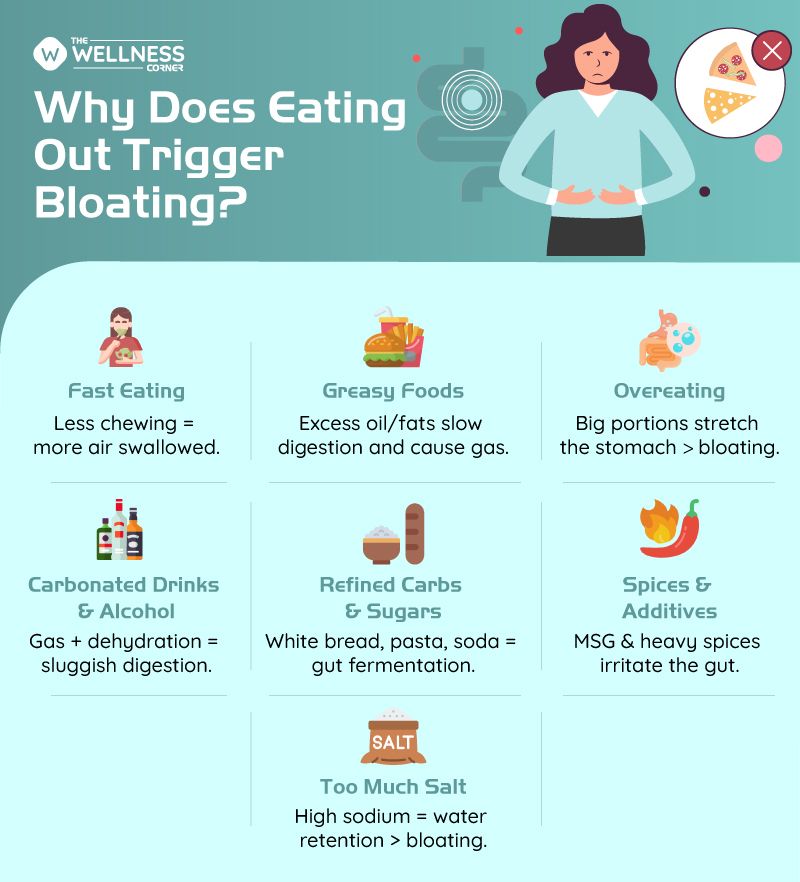Feel Bloated After Eating Out? Experts Recommend Doing This Immediately!
21 hours ago
5 minute read.

You’ve just finished a delicious meal at your favourite restaurant. The ambience was perfect, the food was mouth-watering, and you felt satisfied. But not long after… your stomach starts to feel tight, swollen, and uncomfortable. You unbutton your jeans. You regret ordering that second round of butter naan. And suddenly, the joy of dining out is replaced with the discomfort of bloating.
If this sounds like you, you’re not alone.
Bloating after eating out is incredibly common, and fortunately, there are expert-approved steps you can take immediately to ease the discomfort and feel normal again.
Let’s explore why this happens, what you can do about it right after eating, and how you can prevent it the next time.
Also Read: How Dietary Choices Affect Bloating And Gas?
First, What Exactly Is Bloating?
Bloating refers to a sensation of fullness or swelling in the abdomen, and is commonly experienced along with:
- Tightness or pressure
- A visibly bigger belly
- Gurgling sounds
- Gas or flatulence
- Sometimes, mild pain or cramps
It occurs when gas builds up in your digestive tract or your body retains water. This slows digestion and creates pressure in your stomach and intestines—especially after large or heavy meals.

Why Does Eating Out Trigger Bloating?
Eating out isn’t just about food—it’s about flavours, indulgence, and enjoyment. But most restaurant or takeout meals contain hidden ingredients and factors that mess with your digestion:
1. Excess Salt (Sodium Overload)
Sodium is everywhere in restaurant food—soups, sauces, fried items, even desserts. Salt makes your body retain water, leading to water retention and bloating.
2. Heavy Fats and Oils
Restaurant meals are often cooked in more oil or butter than you use at home. Fats take longer to digest, slowing down gastric emptying and increasing the chances of bloating and gas.
3. Refined Carbohydrates & Sugars
That garlic bread, creamy white pasta, or fizzy soda you indulged in? These refined carbs break down quickly, causing spikes in blood sugar and fermentation in your gut, which leads to gas.
4. Spices & Additives
While spices can be good in moderation, strong spice mixes, MSG, and artificial flavour enhancers can irritate your gut and lead to acid buildup or digestive distress.
5. Carbonated Drinks & Alcohol
Soft drinks and beer contain gas. Alcohol dehydrates your body. Both contribute to sluggish digestion and uncomfortable bloating.
6. Eating Too Fast
In restaurants, we often eat quickly—either because we’re hungry or caught up in conversation. This leads to swallowing air and less chewing, which burdens your digestive system.
7. Overeating
Let’s admit it: portions when eating out are often too generous. We eat more than needed because we don’t want to waste food or because it’s too delicious to resist. Overeating literally stretches your stomach, slowing digestion and causing bloating.

So, What Should You Do Immediately After Eating Out?
If you're starting to feel bloated, the best thing you can do isn’t to reach for a pill or go lie down. Experts recommend a surprisingly simple remedy:
Take a 10–15 Minute Walk
That’s right! A gentle walk is one of the most effective, natural remedies to relieve bloating after a meal.
Why walking helps?
- It stimulates your digestive system
- It encourages the movement of gas through the intestines
- It lowers post-meal blood sugar spikes
- It prevents constipation
- It reduces the chances of acid reflux
“Even a short walk can help your body process food better and faster. Think of it as giving your gut a gentle push in the right direction.” – Nutritionist recommendation
Don’t aim for a brisk or sweaty walk—just slow to moderate walking, ideally in fresh air or even indoors if needed.
Must Read: What Happens When You Walk After Eating?
Other Expert-Recommended Tips to Relieve Bloating Instantly
Besides walking, here’s what you can do right after your meal to reduce bloating:
1. Sip on Warm Water or Herbal Tea
Warm water can calm your digestive system and improve circulation. You can also try:
- Jeera (Cumin) Water – Enhances digestion and relieves gas.
- Ajwain (Carom Seed) Water – Breaks down food and soothes indigestion.
- Ginger Tea – Reduces inflammation, bloating, and nausea.
- Peppermint Tea – Relaxes stomach muscles and helps release trapped gas.
- Lemon water (without sugar) – Encourages bile flow and digestion.
Avoid cold drinks—they slow down the digestive process.
2. Do Gentle Seated or Lying Yoga Poses
Just try a few easy poses to encourage gas movement:
- Pawanmuktasana (Wind-Relieving Pose) – Lie on your back, pull your knees toward your chest.
- Seated Forward Fold (Paschimottanasana) – While seated, stretch forward toward your toes.
- Supine Twist – Lie flat on your back and gently guide one knee across your body to the opposite side.
3. Massage Your Abdomen (Clockwise Motion)
Gently rub your stomach in slow, clockwise circles using light pressure. This follows the natural path of your colon and can:
- Relieve trapped gas
- Stimulate movement in your bowels
- Ease cramping and pressure
4. Change Into Loose Clothing
Tight belts, jeans, or body-hugging outfits can restrict your abdomen and make bloating worse. Slip into something more comfortable to allow your digestive organs to function freely.
5. Avoid Lying Down for At Least 2–3 Hours
Lying down after a meal slows digestion and increases acid reflux risk. Stay upright—sit on a chair with back support, or walk around lightly.

What NOT To Do After Eating Out?
Avoid these post-meal habits that can make your bloating worse:
- Don’t lie down immediately
- Don’t gulp down large amounts of water
- Don’t take over-the-counter antacids regularly unless advised by a doctor
- Don’t smoke or drink more alcohol
- Don’t eat dessert immediately
Long-Term Tips to Prevent Bloating When Dining Out
If bloating after restaurant meals is a regular issue, these habits can help:
1. Practice Mindful Eating: Chew slowly, don’t rush your meals, and pause between bites.
2. Watch What You Order: Opt for lighter cooking methods such as grilling, steaming, or sautéing rather than fried or creamy options. Ask for sauces and dressings to be served separately.
3. Limit Fizzy & Alcoholic Drinks: Opt for plain water, herbal teas, or lemon-infused water instead.
4. Portion Control: Split dishes or opt for smaller portions. It's okay to leave food behind—don’t feel obligated to clean your plate.
5. Know Your Triggers: Certain people are more sensitive to dairy, gluten, or spicy food. Keep a food journal if needed.
6. Support Your Gut Daily: Incorporate probiotics (curd, kefir, fermented foods), fibre-rich fruits and veggies, and digestion-supporting herbs into your everyday diet.
When Should You Be Concerned?
Occasional bloating is normal. But if you experience bloating frequently (even when eating at home), or it’s accompanied by other symptoms like:
- Abdominal pain
- Nausea or vomiting
- Constipation or diarrhea
- Sudden weight changes
…it’s best to consult a healthcare provider to rule out underlying conditions like IBS, food intolerances, gut infections, or hormonal imbalances.

Final Thoughts
Bloating after eating out doesn’t mean you have to swear off your favourite foods or avoid social dinners. It simply means your digestive system needs a little help processing everything you just enjoyed.
Over time, these habits will not only make you feel better faster but also improve your overall gut health and relationship with food.
Leave a Comment
Related Articles
Health Checks @ Home
Service
Explore
© 2025 Truworth Health Technologies Pvt. Ltd.




